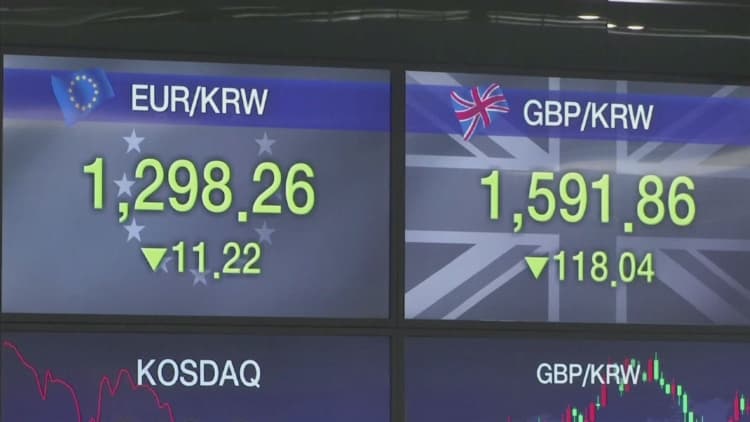
A number of major banks have started to cut their near-term forecasts for sterling signaling a weakness in the U.K. economy after Britain voted to exit the European Union (EU).
The currency hit its lowest in nearly 31 years in the early hours of Friday after the referendum results were announced that sent shockwaves across all asset classes globally. However, on Monday sterling further fell below the 31-year low to $1.3221 on speculation that the Bank of England may proceed with a rate cut. Sterling is also at its lowest against the euro since March 2014 at 83.41 pence.
"The move in sterling against the dollar after the U.K. referendum is unprecedented," John Bilton, global head of multi-asset strategy at JP Morgan Asset Management told CNBC via email.
"Sterling is 7 percent lower versus the dollar. Previous experiences of currency volatility warn that there could be aftershocks which could reverberate across asset classes. The currency markets are likely to remain the focal point for expression of political risk. We expect sterling to weaken further and see scope for further pressure on the euro."
A number of banks have cut their sterling forecast since the vote to leave the EU was announced on Friday. HSBC was the first to announce a change to its sterling outlook. The bank said it expects the currency to fall to $1.25 against the dollar in the third quarter and to $1.20 by year-end.
This was followed by Societe Generale that predicted the currency to head towards $1.20-$1.25 in the longer run against the dollar. However, the bank expects the currency to stabilize between $1.30 and $1.35.
On Monday, Goldman Sachs cut its three-month sterling forecast to $1.32 from a previous estimate of $1.47. However, it expects the currency to recover to $1.34 at year-end. Meanwhile, Bank of America Merrill Lynch has taken a rather bearish view of the sterling by slashing its forecast to $1.30 for the end of 2016, from its previous fairly bullish prediction of $1.59.
Goldman Sachs in a note said that it doesn't expect a shock as large as that of the bankruptcy of Lehman Brothers in 2008 or with the same global consequences. "While we do now expect the U.K. to enter a technical recession in the first half of 2017, it should be a mild one by historical standards."
Julius Baer too has revised its forecast for sterling after the yes vote. In a note, the bank said it expected the pound to suffer after the initial shock as fundamentals will turn against it. It further expects the meltdown of foreign direct investments is a longer-term threat for the pound.
"We revise our forecast of the euro against sterling at 0.92 over a 3-month and 1.00 over a 12- month horizon, which admittedly could also unfold earlier," Julius Baer's economist David Meier said in a statement, adding that economic growth is likely to be wiped out in the second half of this year as uncertainty will weigh strongly on investments and hiring.


